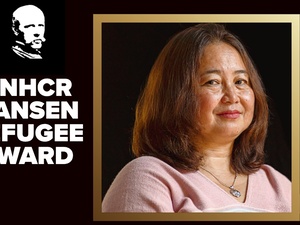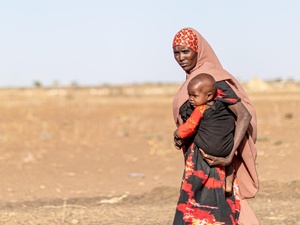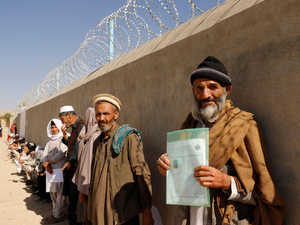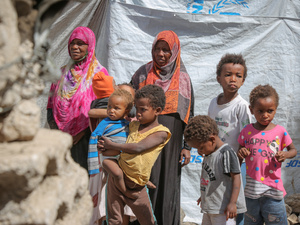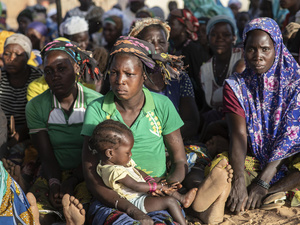One year on, displaced people in western Myanmar ponder future
One year on, displaced people in western Myanmar ponder future

In Sittwe, many displaced people have moved into temporary shelters, but are dependent on aid due to insecurity and restrictions on movement, which affect livelihood opportunities.
SITTWE, Myanmar, June 7 (UNHCR) - Last June, U Myint Htay was forced to flee with his family as deadly inter-communal violence gripped Myanmar's Rakhine state. They left behind their worldly possessions and grocery business.
Two weeks ago they had to pack again, this time with some excitement. After more than 11 months of living in a monastery with 44 other displaced families, they were moving into the latest temporary shelters to be completed by UNHCR.
Carrying a baby, live chickens and household items accumulated over the year, U Myint Htay's family of five moved to their new home in Set Yone Su 3 camp on the outskirts of Sittwe town. Government officials assigned them a unit in the longhouse-style bamboo-framed shelters, and they immediately got down to business - clearing weeds, hanging up potted plants and setting up a hammock for the baby.
"I'm happy to have a proper shelter with some privacy for my family," said the 44-year-old ethnic Rakhine, noting that overcrowding at the monastery created some friction between families. "But I'm worried about work. I'm now a trishaw driver and the new camp is far from town."
Up to 140,000 people remain displaced in Rakhine state today. Many like U Myint Htay have moved into temporary shelters built by the government, UNHCR and other agencies. But there are other issues to worry about.
In Sin Tet Maw, a quaint village in Pauktaw township about an hour's boat ride from Sittwe, U Khin Nghla has been homeless since a second wave of violence drove him from his native Kyaukphyu last October. The 55-year-old ethnic Kaman lives with a host family and relies on food rations from the World Food Programme. His wife makes snacks for sale to support the family, and daily life is a struggle not knowing when their hosts will tire of them.
Most of all, the former fisherman is worried about his children's education. "They attended the government school back home, but here there is nothing," he said, looking at his two teenaged daughters with a mix of pride and regret.
In Sittwe's outskirts, efforts to organize primary education for displaced children have also failed, said Mohammed,* a Muslim community leader. Following last year's unrest, he lost his family land in Sittwe town and was detained for two months. Today he barely leaves his shelter for fear of further arrest.
"Without education, freedom of movement and work, there is no future here," he said. "The government must play a stronger role in reconciliation."
A year may have passed but there are still tensions between the communities. Some are doubtful they can go back to their former homes to live beside neighbours they no longer trust. In some areas, the authorities have been negotiating returns but are blocked by elements in the local community. In other areas, security appears to have stabilized but the displaced people say that restrictions on movements are affecting their ability to earn a living.
Much remains to be done to promote peaceful co-existence between the different communities before returns can happen in a safe and sustainable way. The government will need to boost development across Rakhine State, ease restrictions facing the IDPs, regularize the status of those without documents or citizenship, including facilitation of access to citizenship procedures for those who qualify.
The alternative is unthinkable. Thousands of people have already risked their lives on smugglers' boats in the hope of finding safety and stability elsewhere.
"Until a few weeks ago, 300 to 400 people were leaving the Sittwe area on these boats every night at a cost of 150,000 kyat (US$160) each," said community leader Mohammed . He said the outflow has slowed in May and June due to the rough seas but is expected to pick up again in July, despite the risks of drowning and detention along the way.
Kaman fisherman U Khin Nghla is also looking for a way out: "I want to go back to Kyaukphyu but don't think we can. Maybe I will go to Yangon or Malaysia, where I have relatives. It should be easier to find work there."
*Name changed for protection reasons
By Vivian Tan in Sittwe and Pauktaw, Myanmar


